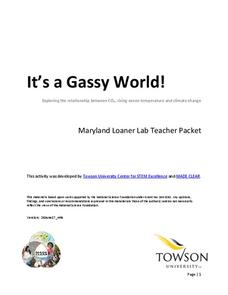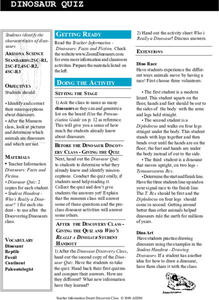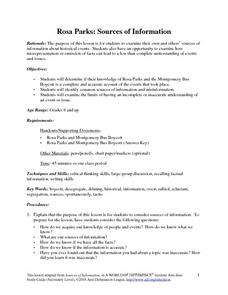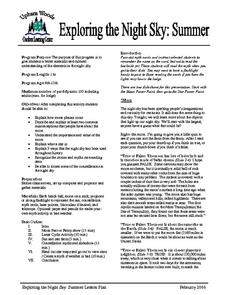Curated OER
Real Ice Ages Longer Than Movie Ice Ages
If your class's knowledge of the Ice Age is limited to animated movies, use this lesson plan to strengthen their knowledge. After sharing what they know about the Ice Age, young readers explore a news article seeking to dispel...
Illustrative Mathematics
Modeling with a Linear Function
Here is a well-designed resource that provides five yes-or-no questions which model different situations with linear functions. It makes a good pre-test for the beginning of the unit. The purpose is to elicit common misconceptions of...
Towson University
It's a Gassy World!
How much does your class know about the relationship between climate change and carbon dioxide? Science scholars explore the nature of greenhouse gases and rising ocean temperature through demonstrations, research, and experiments. The...
Curated OER
The Environment
Students explore the issues that influence our environment and research ways to decrease the negative impact that humans have on the environment. Misconceptions about environmental issues are addressed in this lesson.
Desert Discoveries
Dinosaur Quiz
Young scientists explore the world of dinosaurs. They engage in a variety of activities designed to help correct misconceptions about dinosaurs, and which help them to determine which animals are dinosaurs and which are not. There is a...
Curated OER
True Spin: Music
Upper graders take a critical look at art criticism, music, and politics. They watch one segment of "True Spin," produced by VH1 music television and then discuss myths that relate to art and music. Several modern songs are analyzed...
Anti-Defamation League
Rosa Parks: Sources of Information
Young scholars show what they know about Rosa Parks and the incident on one of the buses in Montgomery, Alabama. Groups discuss and identify where they receive most of their information. They examine the importance of having a complete...
Curated OER
Yam in the Oven
Your vegetable eaters will practice function notation statement interpretation in this short task. These few exercises will bring out misconceptions students may have about function notation as well.
EngageNY
Grade 9 ELA Module 3, Unit 1, Lesson 1
Clear up the misconceptions about autism and individuals on the autism spectrum with an inquiry-based instructional activity. As ninth graders read the first four pages of Temple Grandin's Animals in Translation: Using the Mysteries of...
Generation Rx
My Generation Rx: Plot Twists
How can prescription drugs be dangerous if they were prescribed by a doctor? Is it okay to share your prescription drugs with friends if they really need them? Clear up any common misconceptions about prescription drugs with a set of...
Curated OER
Learning Cycle Lesson Plan #6 (Misconception)
Ninth graders investigate evolution via natural selection and form an opinion. They support their opinion using scientific evidence and apply this to adaptations that have allowed certain organisms to survive.
Curated OER
Stereotypes
Assumptions and misconceptions are two things that underlie stereotypes. Introduce youngsters to the concept of stereotyping with a role-play activity. They pretend they are employees at a restaurant who have accused a person of...
Curated OER
Exploring the Night Sky: Summer
Students explain how moon phases occur. They describe and explain at least two common misconceptions that people have about the moon. Students explain what a star is. They explain 3 ways that the night sky has been used throughout history.
Columbus City Schools
Transformation: Energy in Disguise
Energy transformations happen everywhere, every second of the day. The energy transformation common to most scholars is potential and kinetic energy. The three-week lesson covers multiple types of energy transformations through...
Columbus City Schools
The Mystery of Earth’s History
Every living creature can leave a fossil record, yet most fossils belong to extinct organisms rather than ones currently living. Scholars learn about dating rock layers, fossils, and the environment of the past. Pupils understand that...
EngageNY
Real-World Positive and Negative Numbers and Zero
Class members investigate how positive and negative numbers are useful in the real world. Individuals first read a short passage and identify terms indicating positive and negative numbers. They consider situations involving positive...
Columbus City Schools
Thinking Like A Soil Scientist
Ready to roll up those sleeves and get your hands dirty? Dirty with soil science content, that is! Overcome those "But it's just dirt" objections with a trip outside to collect soil samples for some in-class analysis. Use the variety of...
Columbus City Schools
Sedimentary Rocks
Turn your class discussion of rock formation from ho-hum to holy hornfels! Junior geologists gain experience in identifying rock types and rock origins, with an emphasis in hypothesizing the environment needed to form certain rocks. The...
Columbus City Schools
Totally Tides
Surf's up, big kahunas! How do surfers know when the big waves will appear? They use science! Over the course of five days, dive in to the inner workings of tidal waves and learn to predict sea levels with the moon as your guide.
Columbus City Schools
What’s Up with Matter?
Take a "conservative" approach to planning your next unit on mass and matter! What better way to answer "But where did the gas go?" than with a lab designed to promote good report writing, research skills, and detailed observation. The...
Columbus City Schools
Keeping It Hot!
Hot off the presses, this collection of thermal energy activities, lessons, and printables is sure to amaze. Demonstrate how thermal energy moves about in a system using simple materials. Pupils demonstrate their understanding...
Film Education
Nineteen Eighty-Four: Orwell
Warning or prediction? Nineteen Eighty Four is the anchor text for a series of tasks that ask readers to compare the novel to the film as well as current events to those pictured in George Orwell's dystopian classic.
Curated OER
Contemporary Mexican and Puerto Rican Immigration
Students in an ESL classroom compare and contrast Puetro Rican and Mexican cultures. In groups, they research the reasons why people leave one country for another and how to obtain a visa. As a class, they brainstorm a list of the...
NASA
The Cycle of Matter
An educational lesson focuses on the idea of conservation of matter through a demonstration of the water cycle, a discussion of digesting food, and the path of carbon and oxygen atoms as they change form.
Other popular searches
- Ice Age Misconceptions
- Alcohol Misconceptions
- Science Misconceptions
- Trigonometric Misconceptions
- Misconceptions in Science
- Life Science Misconceptions
- Math Misconceptions
- Sun Misconceptions
- Proofreading Misconceptions
- Misconceptions Recycling
- Bat Misconceptions
- Sex Misconceptions

























